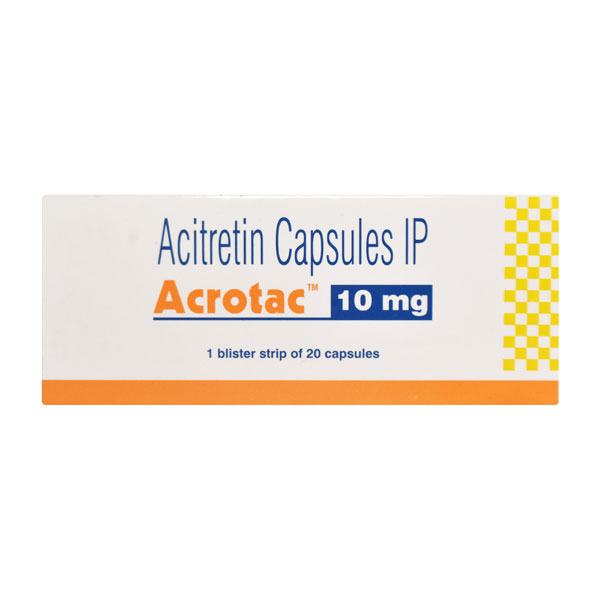-
Product Introduction:
- Acrotac 10mg capsules contain the active ingredient Acitretin, which is a retinoid used in the treatment of severe psoriasis. It is believed to work by affecting the growth and development of skin cells.
Acrotac 10mg Capsules is taken with food in a dose and duration as advised by the doctor. The dose you are given will depend on your condition and how you respond to the medicine. You should keep taking this medicine for as long as your doctor recommends. If you stop treatment too early your symptoms may come back and your condition may worsen. Let your doctor know about all other medications you are taking as some may affect, or be affected by this medicine.
The most common side effects are dry lips, dryness in the mouth, skin peeling, joint pain, itching, runny nose, nosebleeds, hair loss, and increased levels of blood fat. Most of these are temporary and usually resolve with time. Contact your doctor straight away if you are at all concerned about any of these side effects. It may cause dizziness and sleepiness, so do not drive or do anything that requires mental focus until you know how this medicine affects you. Avoid drinking alcohol while taking this medicine as it can make dizziness worse.
Avoid sun exposure and cover the treated areas with clothing or use a sunscreen before stepping out in the sun. Your doctor may get your regular blood tests done to monitor your liver function and the levels of fats such as cholesterol in your blood. You should tell your doctor if you have any kidney or liver diseases so that your doctor can prescribe a suitable dose for you. Before taking this medicine, you should tell your doctor if you are pregnant, planning pregnancy or breastfeeding as Acrotac 10mg Capsules can cause fetal abnormalities.
-
Side Effects:
- Common side effects may include dry skin, itching, peeling, and changes in nail or hair texture.
- Serious side effects may include liver problems, increased blood fats, and effects on bone density.
-
Benefits:
- Acrotac 10mg capsules are primarily used to treat severe psoriasis, a chronic skin condition characterized by red, scaly plaques on the skin.
- It may help reduce the thickness of psoriatic plaques and improve overall skin condition.
-
Usage Guidelines:
- The dosage and duration of Acrotac treatment should be determined by a healthcare professional.
- It is usually taken with food to enhance absorption.
- It’s important not to exceed the prescribed dosage and to follow the healthcare provider’s instructions.
-
Drug Interactions:
- Acitretin may interact with other medications, such as tetracyclines, methotrexate, and certain birth control pills.
- Inform your healthcare provider about all the medications, supplements, and herbal products you are currently taking to avoid potential interactions.
-
Precautions:
- Women of childbearing potential should use effective contraception during and for at least three years after discontinuing Acitretin due to its teratogenic effects.
- Regular monitoring of liver function, blood lipids, and other relevant parameters may be necessary during treatment.
-
Warnings:
- Acitretin can cause birth defects, so it’s crucial for women to avoid pregnancy during and after treatment.
- Liver function should be monitored regularly.
- Patients should avoid excessive alcohol consumption while taking Acitretin.
This information is a general overview, and individual responses to medication can vary. Always follow the advice and instructions provided by your healthcare professional.
SAFETY ADVICE

Alcohol

Pregnancy

Breast feeding

Driving

Kidney

Liver
| Weight | 0.5 kg |
|---|---|
| Dimensions | 10 × 10 × 10 cm |


